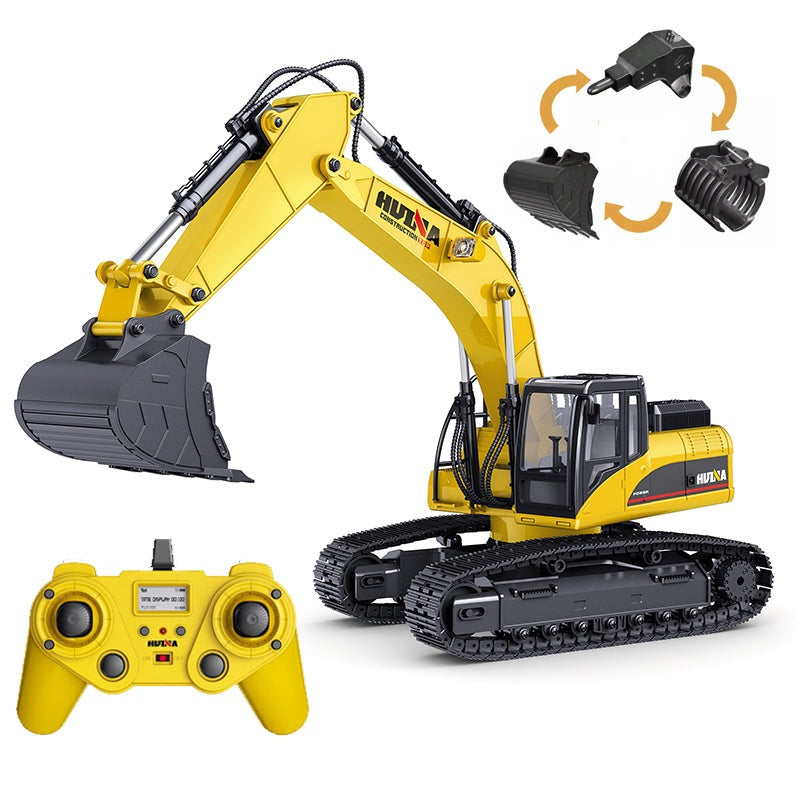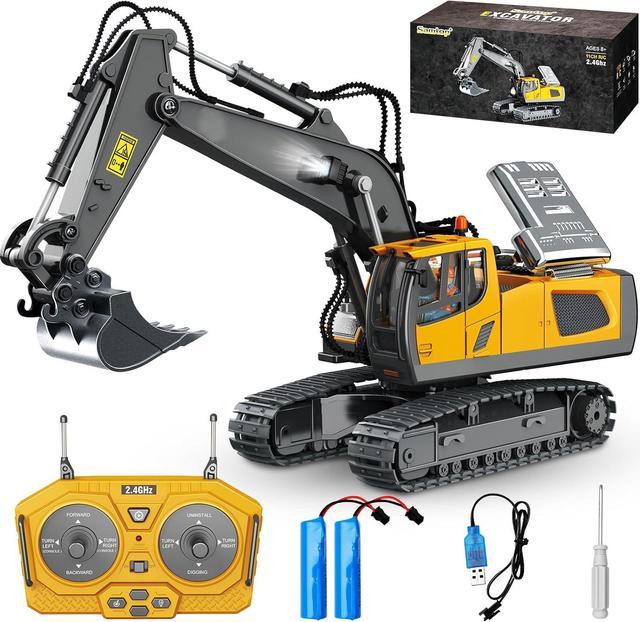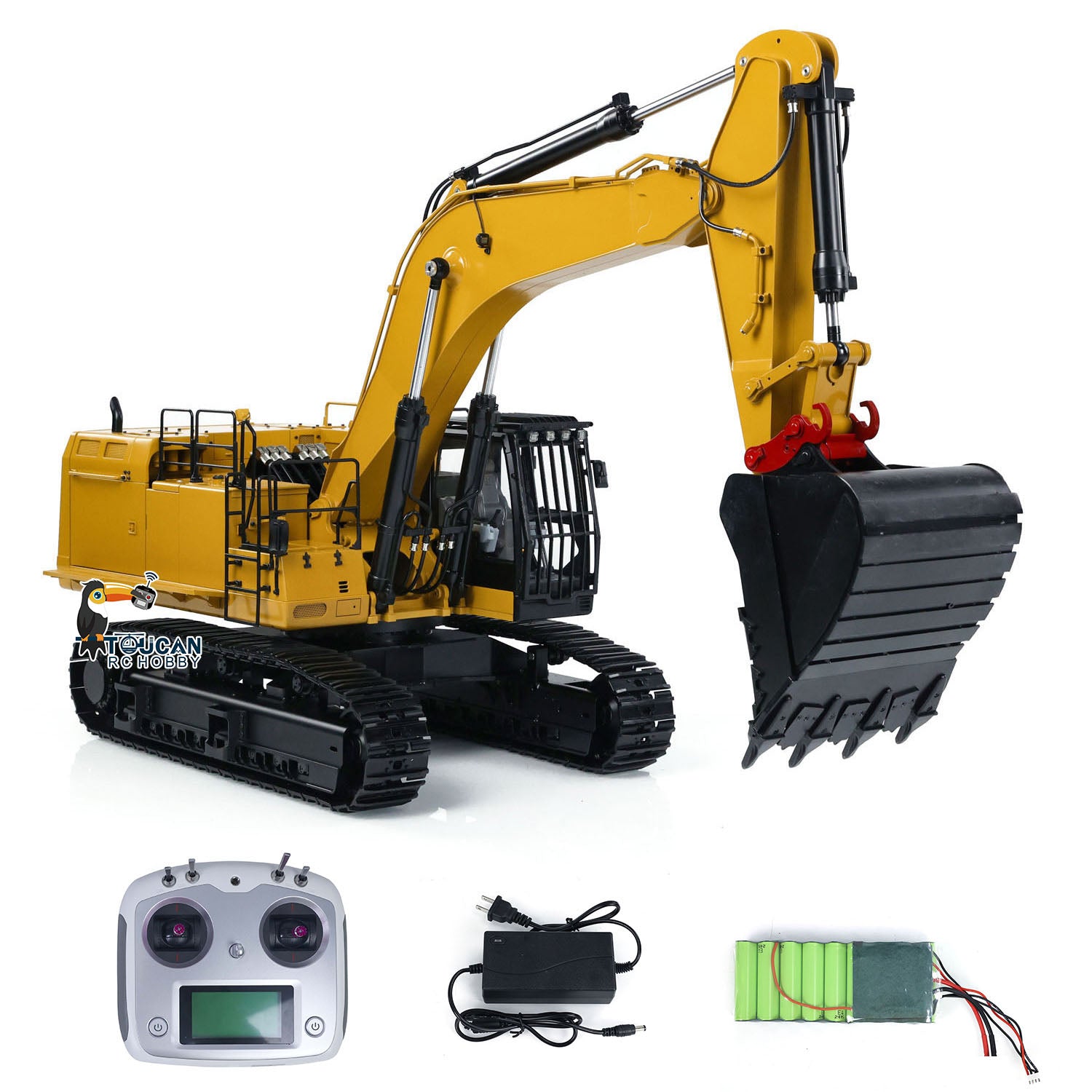The Future of Excavation: Why a rc excavator is Here to Stay
Wiki Article
Comprehending Just How Excavator Works and Its Influence on Efficiency
Excavators play a vital duty in building and mining procedures, relying on a complicated interaction of hydraulic and mechanical systems. Their capability to carry out a variety of tasks hinges on both their layout and the technology incorporated within. Recognizing these elements can significantly influence operational efficiency and performance. As advancements remain to improve the sector, one have to take into consideration exactly how these changes will certainly influence future practices and efficiency.The Essentials of Excavator Mechanics

The Function of Hydraulic Equipments in Excavators
At the heart of excavator operation lies the hydraulic system, which plays a critical function in powering the maker's activities and functions. This system utilizes pressurized hydraulic fluid to transfer power, enabling various activities such as excavating, swinging, and lifting. By using the principles of hydraulics, excavators can carry out jobs with impressive accuracy and force, improving general functional efficiency.The hydraulic system includes vital parts, consisting of shutoffs, cylinders, and pumps, which interact to control the circulation and instructions of the liquid. When the operator engages the controls, the hydraulic liquid is guided to certain cylinders, equating the operator's commands into physical movement. This mechanism enables smooth and responsive actions, which are vital in building and construction and excavation settings. double e volvo rc excavator. The performance of the hydraulic system straight influences the efficiency and adaptability of the excavator, making it an essential element in modern-day excavation proceduresKey Elements of an Excavator
Understanding the essential components of an excavator is essential for comprehending exactly how this effective maker operates. An excavator contains a number of considerable elements, consisting of the undercarriage, house, bucket, arm, and boom. The undercarriage gives stability and flexibility, commonly featuring wheels or tracks to navigate various surfaces. Your home has the engine and hydraulic systems, enabling the driver to control motion and power the equipment. The boom expands from the house, making it possible for vertical reach, while the arm connects to the pail, assisting in digging and training operations.Additionally, the taxi houses the driver, equipped with controls for specific handling. Each of these components plays a vital duty in the excavator's overall performance, adding to its performance and performance on building websites. Comprehending these parts assists in maintaining and maximizing excavator performance, making certain tasks are finished securely and efficiently.Add-on Adaptability and Its Advantages
Attachment adaptability is a vital facet of excavators, allowing drivers to switch over between numerous devices tailored for specific tasks. This versatility not only enhances job efficiency yet also adds to cost-effectiveness by minimizing the requirement for multiple machines. Understanding the different sorts of accessories offered can greatly impact the general performance and capability of an excavator on work websites.Kinds of Attachments
While excavators are mainly acknowledged for their digging capacities, their true versatility hinges on the broad range of add-ons readily available. These add-ons improve the excavator's performance, permitting it to do different tasks past excavation. Typical accessories include pails (for digging and scooping), hydraulic thumbs (for grasping products), and augers (for piercing holes) Grapples are made use of for taking care of and relocating debris, while rippers can separate hard surface areas. Other specialized attachments, such as plates and rakes, enable excavators to adapt to specific work demands. This diversity not just boosts the device's energy throughout different fields, including demolition, construction, and landscape design, however likewise allows operators to customize their devices to meet particular project needs effectively.Increased Work Effectiveness
Taking full advantage of task efficiency is a main advantage of making use of various excavator attachments. Different accessories allow an excavator to do multiple jobs without needing to change tools, saving valuable time and labor. Utilizing a hydraulic hammer can damage concrete while a bucket attachment can dig deep into soil, allowing a smooth process. This adaptability minimizes downtime related to equipment changes and enhances performance on-site. Additionally, specialized accessories boost accuracy in tasks such as grading or landscaping, bring about better results. The capability to adjust to numerous job demands not just improves procedures yet additionally minimizes the need for additional machinery, making sure that projects are finished promptly and successfully. On the whole, accessory convenience significantly contributes to raised work efficiency in excavation job.Cost-Effectiveness and Versatility
Cost-effectiveness is a considerable advantage of making use of flexible excavator accessories. These accessories enable a single excavator to carry out several tasks, lowering the demand for extra machinery and labor - double e volvo rc excavator. By switching in between containers, hammers, and grapples, drivers can take on different projects, from excavating to demolition, therefore taking full advantage of equipment utilization. This versatility not only lowers operational prices yet likewise reduces downtime connected with changing equipment. Additionally, the capacity to personalize excavators with specialized accessories enhances performance, as they can effectively manage varied tasks according to task needs. In conclusion, the combination of cost-effectiveness and versatility in excavator add-ons adds to improved functional effectiveness and resource appropriation in building and excavation projects
Advanced Modern Technology in Modern Excavators
Modern excavators are progressively furnished with sophisticated technology that changes excavation procedures. Automation simplifies procedures, while improved fuel performance try these out minimizes operational prices. In addition, clever control systems boost accuracy and safety and security, noting a substantial development in excavation equipment.Automation in Excavation Processes
As excavation modern technology develops, automation has actually arised as a critical element in enhancing performance and precision on work sites. Modern excavators are outfitted with advanced automated systems that assist in jobs such as grading, digging, and trenching with marginal operator treatment. These systems utilize sensing units, GPS, and device understanding formulas to assure precise positioning and depth control, significantly reducing the margin for mistake. Additionally, automation enables drivers to concentrate on critical decision-making instead of manual controls, resulting in enhanced productivity on the whole. Such technologies not only simplify workflows however also boost security by reducing human error in complicated procedures. As a result, the combination of automation in excavation processes represents a significant advancement in building technology, driving the sector in the direction of better efficiency and efficiency.Improved Gas Effectiveness
Innovations in innovation have actually likewise led to significant improvements in fuel efficiency for contemporary excavators. Modern machines are geared up with advanced engines that optimize power output while decreasing fuel consumption. These engines utilize innovative burning technologies, such as turbocharging and direct fuel injection, to boost efficiency and performance. In addition, lightweight materials in building minimize overall weight, permitting much less power expenditure during procedure. The intro of variable speed controls allows operators to adjust engine efficiency according to certain tasks, even more minimizing gas use. Because of this, these enhancements not only reduced operational costs however also add to environmental sustainability by reducing discharges. In general, enhanced gas effectiveness in excavators is a crucial advancement that boosts performance and financial viability in the building and construction sector.Smart Control Systems
While drivers navigate increasingly intricate job websites, clever control systems in excavators have actually become vital tools for improving efficiency and accuracy. These sophisticated technologies make use of sensors and algorithms to keep track of numerous parameters such as lots weight, terrain problems, and operational efficiency. By automatically changing hydraulic functions, smart systems maximize device efficiency, resulting in boosted productivity and lowered wear on elements. In addition, operators take advantage of intuitive interfaces that give real-time feedback and diagnostics, enabling for educated decision-making. This integration of innovation not only streamlines operations however additionally reduces human mistake, adding to safer workplace. As the building and construction industry continues to develop, wise control systems will certainly play a vital role in shaping the future of excavator effectiveness and efficiency.Enhancing Functional Performance With Excavators
Excavators play an important function in enhancing operational efficiency across various building and excavation jobs. Their adaptability permits several jobs, consisting of material, digging, and training handling, which simplifies operations and reduces the need for additional equipment. With effective hydraulic systems, excavators can perform sturdy jobs with accuracy, significantly reducing the time needed to full jobs. The combination of sophisticated innovation, find more information such as general practitioner and automated controls, further maximizes their procedure, allowing operators to achieve greater precision and minimize material waste. Additionally, modern-day excavators are created to Read More Here take in much less gas and reduce emissions, adding to both expense savings and ecological sustainability. By using excavators successfully, building teams can enhance performance, fulfill task target dates, and boost overall site administration. This multifunctionality and effectiveness make excavators vital tools in the modern-day building landscape.The Future of Excavators in Construction and Mining Industries
As the building and construction and mining markets evolve, the future of excavators is positioned for significant change driven by technological innovation and changing functional demands. Developments in automation and fabricated intelligence are reshaping excavator capabilities, enabling boosted accuracy and effectiveness in operations. Self-governing excavators are arising, minimizing the demand for human treatment and reducing the danger of accidents.Moreover, the integration of telematics and IoT modern technology makes it possible for real-time surveillance of machine performance and predictive upkeep, enhancing uptime. Eco-friendly designs, including hybrid and electric versions, are acquiring grip, lining up with sustainability objectives within the industry.Additionally, the usage of advanced products and lighter designs enhances fuel performance while maintaining performance standards. As these patterns progression, excavators will play an essential role in meeting the enhancing needs for performance and safety in construction and mining, ultimately transforming functional landscapes.Frequently Asked Questions
Exactly How Do Weather Condition Problems Impact Excavator Performance?

Weather greatly affect excavator performance, as rain and mud can prevent traction and stability, while extreme temperature levels might affect hydraulic systems. Operators has to adjust to these variables to guarantee ideal capability and security during operations.
What Precaution Should Operators Comply With While Using Excavators?
Precaution for excavator operators include putting on proper personal protective tools, performing pre-operation assessments, making sure proper interaction with ground personnel, maintaining a risk-free distance from overhanging threats, and adhering to well-known functional protocols to stop accidents.Just How Usually Should Excavators Be Preserved for Optimum Performance?
Excavators need to be kept on a regular basis to guarantee peak performance, commonly every 250 operating hours or as specified by the maker. Regular checks enhance dependability, prevent unanticipated break downs, and expand the lifespan of the devices.
What Is the Ordinary Lifespan of an Excavator?
The typical life-span of an excavator generally varies from 10,000 to 15,000 hours of procedure. Factors affecting long life include maintenance techniques, operating conditions, and the high quality of the equipment itself, impacting overall efficiency and efficiency.
Can Excavators Run on Irregular Terrain Efficiently?
Excavators can run effectively on unequal surface due to their verbalized layouts and adjustable tracks. These functions permit them to preserve security and traction, allowing reliable operation in challenging atmospheres commonly experienced in building and landscape design jobs. Each of these components plays an essential function in the excavator's total functionality, contributing to its performance and effectiveness on building websites. Taking full advantage of work efficiency is a primary advantage of making use of numerous excavator attachments. While drivers browse increasingly intricate job sites, smart control systems in excavators have actually emerged as vital devices for enhancing efficiency and accuracy. Excavators play a crucial duty in improving functional efficiency throughout different construction and excavation tasks. Breakthroughs in automation and synthetic knowledge are reshaping excavator abilities, enabling for improved precision and performance in operations.Report this wiki page